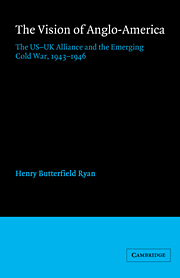Book contents
- Frontmatter
- Contents
- ACKNOWLEDGEMENTS
- INTRODUCTION
- PART I STRENGTHENING THE TIES: THE EFFORT AND THE PROBLEMS
- PART II FOREIGN CRISES THAT DEMONSTRATE GREAT BRITAIN'S PROBLEMS
- INTRODUCTION
- 5 Background and build-up
- 6 Involvement of Great Britain and the United States
- 7 Yalta and after
- 8 Truman: the new factor
- 9 The gathering for the San Francisco Conference
- 10 Between San Francisco and Potsdam
- 11 Concluding thoughts on the Polish crisis
- 12 Background of the crisis
- 13 1944, the critical year
- 14 The role of the press
- 15 The crisis peaks
- 16 America dives in
- CONCLUSION
- NOTES
- BIBLIOGRAPHY
- INDEX
INTRODUCTION
from PART II - FOREIGN CRISES THAT DEMONSTRATE GREAT BRITAIN'S PROBLEMS
Published online by Cambridge University Press: 07 December 2009
- Frontmatter
- Contents
- ACKNOWLEDGEMENTS
- INTRODUCTION
- PART I STRENGTHENING THE TIES: THE EFFORT AND THE PROBLEMS
- PART II FOREIGN CRISES THAT DEMONSTRATE GREAT BRITAIN'S PROBLEMS
- INTRODUCTION
- 5 Background and build-up
- 6 Involvement of Great Britain and the United States
- 7 Yalta and after
- 8 Truman: the new factor
- 9 The gathering for the San Francisco Conference
- 10 Between San Francisco and Potsdam
- 11 Concluding thoughts on the Polish crisis
- 12 Background of the crisis
- 13 1944, the critical year
- 14 The role of the press
- 15 The crisis peaks
- 16 America dives in
- CONCLUSION
- NOTES
- BIBLIOGRAPHY
- INDEX
Summary
Having considered direct Anglo-American relations, let us now review Great Britain's policies in third countries to demonstrate how, even in those cases, American considerations were crucial. Examining two major crises in the mid-1940s, those in Poland and in Greece, we discover many of the phenomena revealed in our study of direct US–UK interaction.
In both cases Britain was determined to have American support and in both it was clear that without it she was nearly helpless to achieve her foreign policy objectives. Whitehall's task was to convince its ally of the validity of British foreign policy goals and of the desirability of making them Anglo-American goals, deserving the application of American strength for their achievement.
In these two case studies we also can trace a very significant change of American attitude and policy. During the Polish crisis, Churchill, Eden, and others in the British Government became strident in their warnings about Soviet intentions. American officials, responding to many pressures, of which this was one, began to change their views about the USSR, coming to fear that it might be more than just a mistrusting and truculent ally. If they did not yet generally regard it as an adversary, many had come nonetheless to believe that only great firmness would restrain its international ambitions. Their concern grew in the months following the uneasy resolution of the Polish crisis in July 1945 and focussed on various other issues, including the struggle in Greece.
- Type
- Chapter
- Information
- The Vision of Anglo-AmericaThe US-UK Alliance and the Emerging Cold War, 1943–1946, pp. 71 - 72Publisher: Cambridge University PressPrint publication year: 1987



